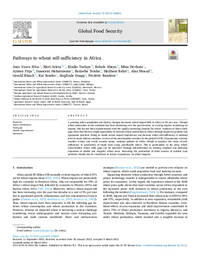Pathways to wheat self-sufficiency in Africa

Authors:
A growing urban population and dietary changes increased wheat import bills in Africa to 9% per year. Though wheat production in the continent has been increasing over the past decades, to varying degrees depending on regions, this has not been commensurate with the rapidly increasing demand for wheat. Analyses of wheat yield
gaps show that there is ample opportunity to increase wheat production in Africa through improved genetics and
agronomic practices. Doing so would reduce import dependency and increase wheat self-sufficiency at national
level in many African countries. In view of the uncertainties revealed by the global COVID-19 pandemic, extreme
weather events, and world security issues, national policies in Africa should re-consider the value of self-sufficiency in production of staple food crops, specifically wheat. This is particularly so for areas where water-limited wheat yield gaps can be narrowed through intensification on existing cropland and judicious expansion of rainfed and irrigated wheat areas. Increasing the production of other sources of calories (and proteins) should also be considered to reduce dependency on wheat imports.
